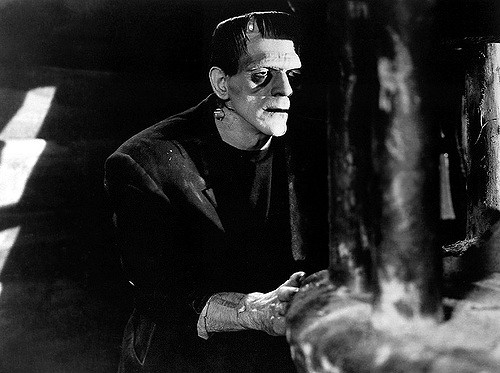Frankenstein is 200 years old this year. He doesn’t look a day over 157. Not many books written two centuries ago that are both still in print and eagerly consumed — even fewer of that vintage that were written by a teenage girl.
Girl, of course, is a relative term, as Mary Shelley had already been involved with her lover’s marital breakup and her own parents were avant-garde types that, even by today’s liquid standards, were not living exactly by the kind of guidelines found in the Baltimore Catechism.
But her one great artistic endeavor endures, and I think it does so for good reason.
First, it is a solid piece of literature and as I have hectored before, a book that not enough people have read, but should. Inside the covers they would find a compelling story that travels so much further than any of its cinematic versions.
And there have been legion of movie versions of a story that began as a dare on a stormy night in a secluded mountain retreat. The Universal blockbuster “Frankenstein” in 1931 has much to answer for. It did a lot of damage to the essence of the book, creating more monster than damaged creature — going for, at the time, shocking horror — when the “true” story is more psychological and spiritual drama. But Universal made up for that with the sequel “Bride of Frankenstein” which was more faithful to the big ideas the young Ms. Shelley was trying to convey.
And that message is found in the subtitle of the book, “The Modern Prometheus.” Dr. Victor Frankenstein realizes early on in his experiments that he has gone somewhere he ought not have gone. He has stepped on God’s toes and understands this almost immediately. The result of this oh-too-late realization, though, has a rippling effect of moral disasters.
Mary Shelley was by no stretch of the imagination a Christian apologist. She was born into a bohemian family of “free thinkers” and sexual libertines. Placing her in the context of the early 1800s makes her parents’ as well as her own lifestyle choices truly unconventional at a time when there were crowned heads throughout Europe.
Yet, somewhere deep down inside this 18-year-old girl’s heart was the knowledge of a force greater than she could contradict. A supernatural order, that when her protagonists in the guise of Victor Frankenstein abuses that order, the price is death and emotional/spiritual collapse.
If the creature created out of clandestinely acquired human body parts (sound familiar?) was just a monster, as he has been portrayed in so many lesser movie versions, the book would not be celebrating its 200th anniversary. Instead, the creature of the novel is more victim than victimizer. He is abandoned by the one who created him, and that abandonment leads him to want to seek vengeance and make Dr. Frankenstein feel the same psychic pain the creature feels. He does a good job of it too.
The creature also knows it is not good to be alone and wants a suitable mate. Of course, that doesn’t end well either because the entire premise of his existence is flawed. Try as he might to conform his unnatural state to the rhythm and logic of God’s divine plan, he only generates more unhappiness.
That’s a lot of thematic stuff for a book that most people think of as just being about a guy with bolts on his neck who has a rather awkward and unconventional means of communication.
And all of this came from the mind of an 18-year-old with little or no interest in the God of the Bible. Yet there are recurring biblical themes resonating throughout the book that not only apply to 19th century Europe but 21st century Los Angeles as well.
Frankenstein is proof Mary Shelley could imagine a lot, but I doubt she and her bohemian parents could have imagined the world we inhabit today — where “free” love and license of whatever lifestyle one wants to indulge is openly endorsed by the mainstream culture.
Victor Frankenstein’s fictional life was a cautionary tale about the ramifications that can happen when we openly defy God’s divine plan. In our world, which includes “designer babies” and even clones of our favorite cocker spaniel, I shudder to think what God has in mind to get our attention.
Robert Brennan is a weekly columnist for Angelus online and in print. He has written for many Catholic publications, including National Catholic Register and Our Sunday Visitor. He spent 25 years as a television writer, and is currently the Director of Communications for the Salvation Army California South Division.
Start your day with Always Forward, our award-winning e-newsletter. Get this smart, handpicked selection of the day’s top news, analysis, and opinion, delivered to your inbox. Sign up absolutely free today!

